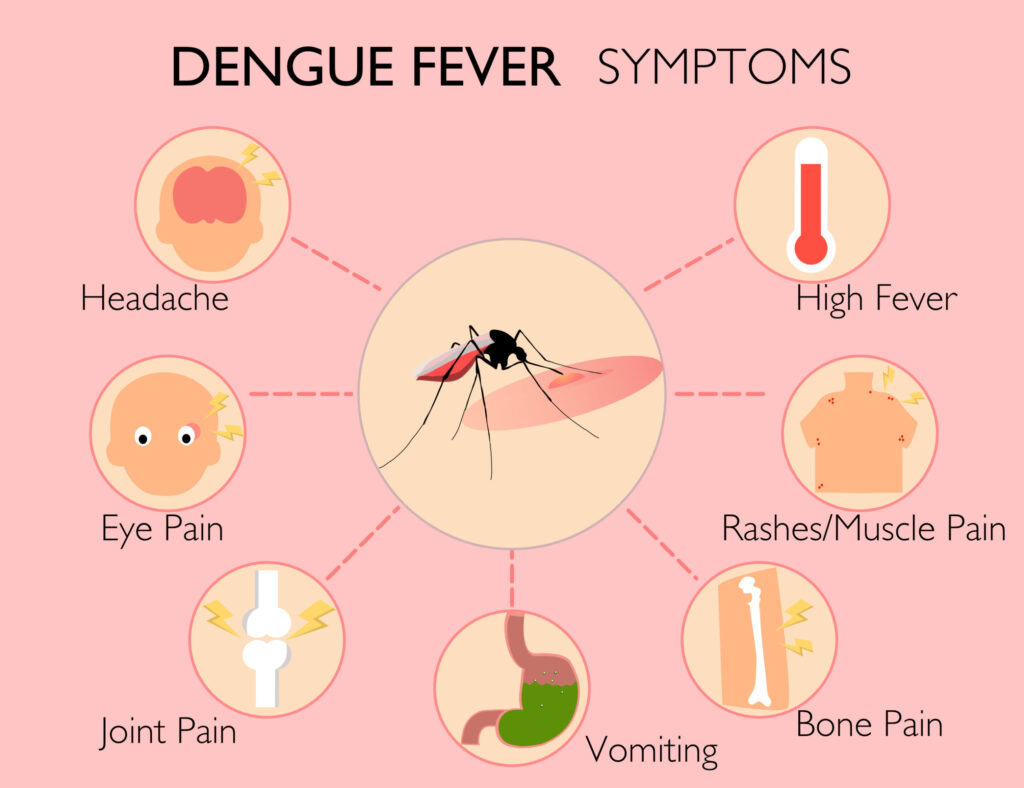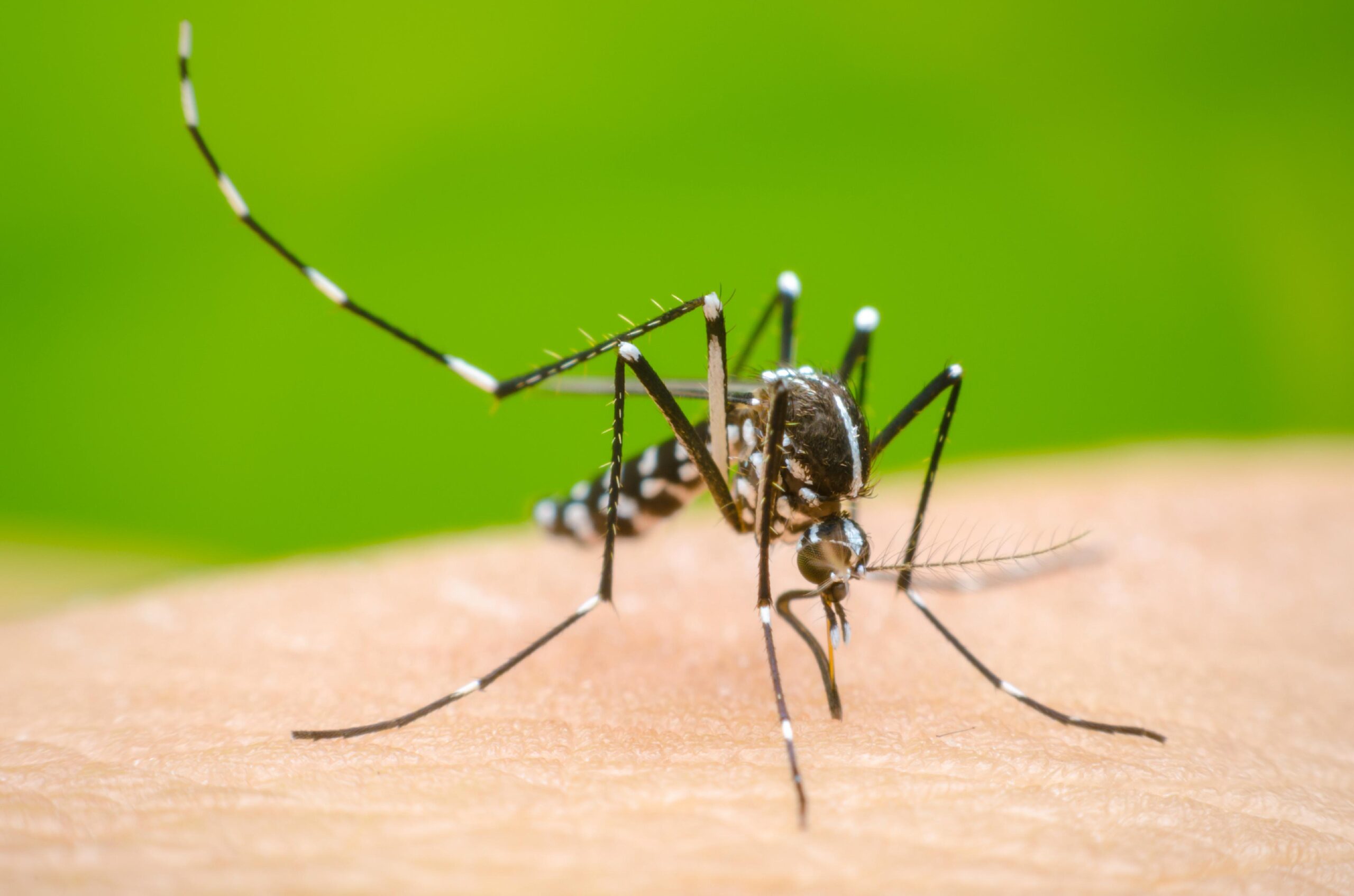By Dr. Vipul Agarwal
Dengue fever is an infection caused by viruses called the “dengue viruses. ”Dengue fever is spread by mosquitoes that carry dengue viruses. People who live in areas where these mosquitoes are common have the highest risk of infection. These areas include southern Asia, Central, and South America, and the Caribbean.
What are the symptoms of dengue fever?
Symptoms usually happen 4 to 7 days after a bite from a mosquito that carries the dengue virus. But they can happen up to 2 weeks later. Symptoms usually last 5 to 10 days.
Dengue fever symptoms are different for each person. They can be mild or severe. They can include:
- Fever
- Headache
- Pain behind the eyes
- Joint and muscle pain
- Feeling tired, sometimes for days to weeks
- Rash – This can be flat or have small bumps. It might be itchy. A rash is more common in people who have not been infected with a dengue virus before.
- Stomach problems, such as nausea, vomiting, and diarrhea
- Cough, sore throat, and stuffy nose – The throat might look red.
- Red eyes

Children and younger people often have less severe symptoms. People who had dengue fever in the past and get infected with a different dengue virus have the highest risk of severe symptoms.
A person with severe dengue fever might:
- Have bad belly pain
- Get bruises without bumping into anything – The person might also have small purple spots on the skin.
- Vomit blood
- Get nosebleeds
- Have black bowel movements
- Have seizures – A person who has a seizure might pass out or move or behave strangely. For example, they might shake or fall down.
A woman might also have bleeding between her menstrual periods.
Should I see a doctor?
Yes. If you live in a country where dengue fever is common, see a doctor if you have any of the symptoms.
Is there a test for dengue fever?
Yes. A doctor might be able to tell if you have dengue fever by doing an exam and learning about the symptoms. They can also do blood tests. These tests can show if you have dengue fever or another disease that causes similar symptoms, such as Zika virus infection.
How is dengue fever treated?
There is no treatment for the virus that causes dengue fever, but doctors can treat the symptoms. Very sick people can be treated in the hospital. Treatments include:
- Blood transfusions – If the infection causes severe bleeding, doctors can give the person blood that someone else has given to the hospital.
- Getting fluids through a tube called an “IV” or intravenous fluids
Some people are at risk of getting sicker from dengue fever than other people. This includes:
- Pregnant women
- Babies
- Older people
- People with obesity
- People who have diabetes, kidney failure, or certain blood diseases
These people might need to go to the hospital if they get dengue fever. Doctors can watch for severe symptoms and treat them if they happen. People who live alone or far from a doctor’s office or hospital might also need to stay in the hospital. That way, they can be treated right away if they get very sick.
People who are not as sick can usually rest at home. If you have dengue fever, you might need to see a doctor every day until you get better. The doctor can do blood tests and check your blood pressure. These checkups are important because dengue fever can cause serious bleeding. Doctors can look to see if this is happening, and treat it early if it does.

Is there anything I can do on my own to feel better?
Yes. If the doctor says you do not need to go to the hospital, you can stay home, rest, and drink plenty of fluids. You can also take acetaminophen/ paracetamol (sample brand name: Dolo/Calpol in India) to relieve fever and aches.
Do not take aspirin or NSAIDs, such as ibuprofen or naproxen. These medicines can increase the risk of bleeding in people with dengue fever. Never give aspirin or medicines that contain aspirin to children younger than 18 years. In children, aspirin can cause a serious problem called Reye syndrome.
Can dengue fever be prevented?
Yes. The best way to prevent dengue fever is to avoid the mosquitoes that carry it. Not all countries where dengue fever is common control mosquitoes well. But you can lower your chances of getting dengue fever if you live or travel there.
You can:
- Stay inside during the day, when the mosquitoes that carry dengue fever are most active. Buildings with screens and air conditioning are the safest.
- Wear shoes, long-sleeved shirts, long pants, and a hat when you go outside.
- Wear a bug spray or cream that contains DEET or a chemical called picaridin. Check the label to make sure. Do not use DEET on babies younger than 2 months.
- On your clothes and gear, use bug repellants that have a chemical called permethrin.
- Drain any standing water near your homes, such as wading pools, buckets, and potted plants with saucers. Mosquitoes breed in standing water.
By Dr.Vipul Agarwal (MBBS, MD (Internal Medicine), FAGE Assistant Professor, Department of Internal Medicine, Mahatma Gandhi medical college, Jaipur

Leave a Reply